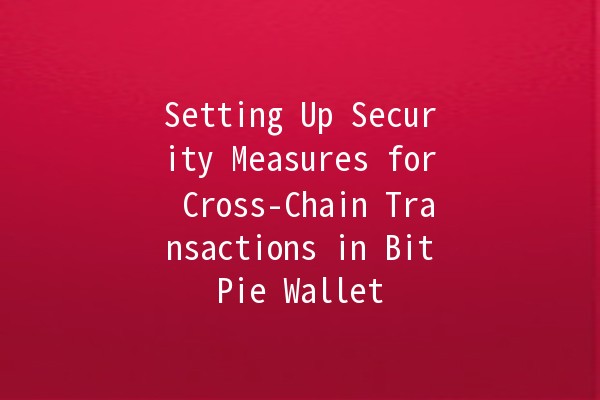
In today's rapidly evolving digital landscape, the importance of safeguarding cryptocurrency assets cannot be overstated. With the rise of crosschain transactions, users of BitPie Wallet must deploy effective security measures to mitigate risks. This article delves into practical strategies and tips for setting up robust security protocols while engaging in crosschain transactions.
Understanding CrossChain Transactions
Crosschain transactions allow users to exchange assets between different blockchain networks without the need for intermediaries. This enhances flexibility and liquidity in crypto trading but also introduces unique security challenges. The decentralized nature of blockchain technology requires users to take proactive steps to protect their assets.
Benefits of CrossChain Transactions
Key Security Challenges

Five Essential Security Measures for CrossChain Transactions
Description: Activating 2FA on the BitPie Wallet adds an extra layer of security by requiring a secondary verification step during transactions.
Application Example: Users can link their wallet to an authentication app such as Google Authenticator or receive SMS codes. Each time you log in or initiate a transaction, you'll need to enter the code generated, significantly reducing the chances of unauthorized access.
Description: Hardware wallets serve as offline storage solutions that safeguard your private keys from online threats.
Application Example: When engaging in crosschain transactions, you can transfer your assets to a hardware wallet for storage. This ensures that your private keys are physically separated from any device connected to the internet, protecting them against hacking attempts.
Description: Keeping your BitPie Wallet and any associated software updated helps protect against known vulnerabilities and exploits.
Application Example: Set reminders to regularly check for updates on the BitPie Wallet app and your hardware wallets. Developers often release security patches to address recent threats, so staying updated ensures you’re using the most secure version available.
Description: Your seed phrase is your ticket to accessing your wallet. Keeping it safe is paramount.
Application Example: Write down your seed phrase on paper and store it in a secure location, such as a safe. Avoid digital copies that could be compromised. Consider using options like simple encryption or splitting your phrase into parts, keeping them in different storage locations for added security.
Description: Before executing any crosschain transaction, doublecheck all transaction details to ensure accuracy.
Application Example: Review the recipient’s address, amount, and network fees before clicking “send.” Use reliable blockchain explorers to verify transaction details and confirm the legitimacy of the transaction. This helps prevent costly errors and potential losses.
Common Risks Associated with CrossChain Transactions
Smart Contract Exploits
Crosschain transactions often leverage smart contracts, which can contain undiscovered bugs. Malicious hackers can exploit these vulnerabilities, leading to significant financial losses.
Phishing Attempts
Phishing scams are rampant in the crypto world. Users might receive unsolicited messages directing them to fraudulent websites that mimic the BitPie Wallet interface.
Lost Private Keys
Losing access to your private keys can result in permanent loss of funds. Mismanagement, such as not backing up enough or storing keys in insecure locations, can compromise your assets.
Frequently Asked Questions (FAQs)
Crosschain transactions allow users to transfer assets between different blockchain networks. This technology enhances interoperability and facilitates trading various cryptocurrencies across diverse platforms.
Implementing security measures such as twofactor authentication, hardware wallets, keeping software updated, protecting your seed phrase, and verifying transaction details can greatly enhance the security of your crypto transactions.
A seed phrase is a critical security feature that allows users to recover their wallet. It is imperative to keep it secret and secure, as anyone with access can control your funds.
Yes, hardware wallets provide superior security compared to software wallets. They keep your private keys offline, reducing the risk of hacks and unauthorized access.
If you suspect a phishing attempt, do not provide any personal information or click on suspicious links. Report the phishing site, and ensure your accounts have not been compromised. Always access your BitPie Wallet through official links.
Unfortunately, if you lose access to your private key without a backup, there is no way to recover your funds. It is vital to back up your keys securely to avoid such a situation.
Setting up security measures for crosschain transactions in BitPie Wallet is crucial in today’s crypto environment. Implementing effective strategies, such as enabling twofactor authentication, using hardware wallets, regularly updating software, securing your seed phrase, and verifying transaction details, helps ensure the safety of your assets. By taking proactive measures, users can confidently navigate the complexities of crosschain trading, minimizing the risks associated with this innovative and valuable technology.

